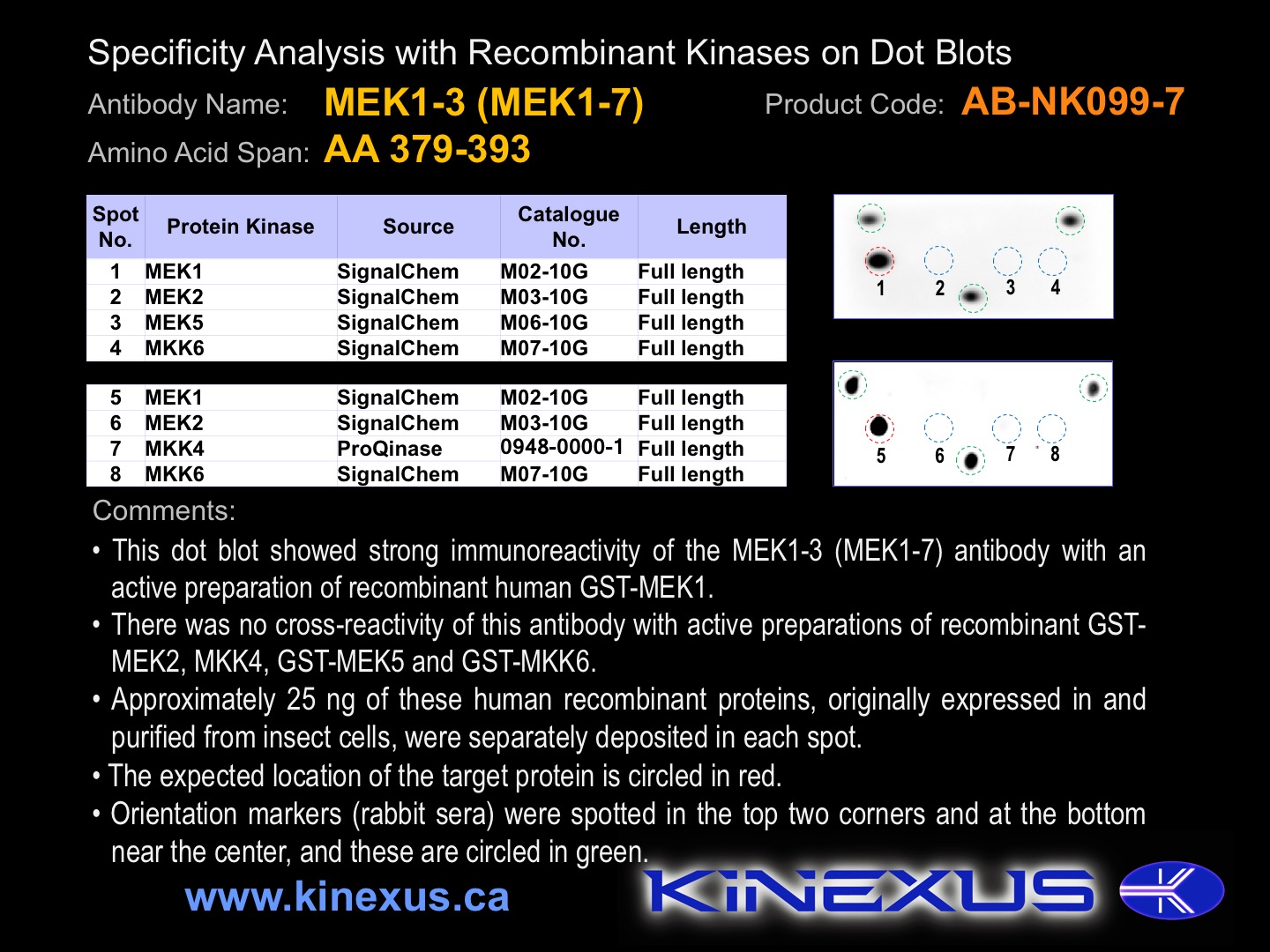Product Name: MEK1-3 (MEK1-7)
Product Number: AB-NK099-7
| Size: | 25 µg | Price: | 89.00 | |
| $US |
Target Full Name: MAPK/ERK protein-serine kinase 1 (MKK1); Dual specificity mitogen-activated protein kinase kinase 1
Target Alias: ERK activator kinase 1; Kinase MEK1; MAP kinase kinase 1; MAP2K1; MAPK,ERK kinase 1; MAPK/ERK kinase 1; MAPKK 1; MAPKK1; MKK1; PRKMK1; CCDS10216.1; Q02750; ENSG00000169032
Product Type Specific: Protein kinase pan-specific antibody
Antibody Code: NK099-7
Antibody Target Type: Pan-specific
Protein UniProt: Q02750
Protein SigNET: Q02750
Antibody Type: Polyclonal
Antibody Host Species: Rabbit
Target Alias: ERK activator kinase 1; Kinase MEK1; MAP kinase kinase 1; MAP2K1; MAPK,ERK kinase 1; MAPK/ERK kinase 1; MAPKK 1; MAPKK1; MKK1; PRKMK1; CCDS10216.1; Q02750; ENSG00000169032
Product Type Specific: Protein kinase pan-specific antibody
Antibody Code: NK099-7
Antibody Target Type: Pan-specific
Protein UniProt: Q02750
Protein SigNET: Q02750
Antibody Type: Polyclonal
Antibody Host Species: Rabbit
Antibody Immunogen Source: Human MEK1 (MKK1, MAP2K1) sequence peptide Cat. No.: PE-01AVU95
Antibody Immunogen Sequence: CIGLNQPSTPTHAAGV
Antibody Immunogen Description: Corresponds to amino acid residues I379 to V393; C-terminus
Antibody Immunogen Sequence: CIGLNQPSTPTHAAGV
Antibody Immunogen Description: Corresponds to amino acid residues I379 to V393; C-terminus
Production Method: The immunizing peptide was produced by solid phase synthesis on a multipep peptide synthesizer and purified by reverse-phase hplc chromatography. Purity was assessed by analytical hplc and the amino acid sequence confirmed by mass spectrometry analysis. This peptide was coupled to KLH prior to immunization into rabbits. New Zealand White rabbits were subcutaneously injected with KLH-coupled immunizing peptide every 4 weeks for 4 months. The sera from these animals was applied onto an agarose column to which the immunogen peptide was thio-linked. Antibody was eluted from the column with 0.1 M glycine, pH 2.5. Subsequently, the antibody solution was neutralized to pH 7.0 with saturated Tris.
Antibody Modification: Unconjugated. Contact KInexus if you are interest in having the antibody biotinylated or coupled with fluorescent dyes.
Antibody Concentration: 1 mg/ml
Antibody Modification: Unconjugated. Contact KInexus if you are interest in having the antibody biotinylated or coupled with fluorescent dyes.
Antibody Concentration: 1 mg/ml
Storage Buffer: Phosphate buffered saline pH 7.4, 0.05% Thimerasol
Storage Conditions: For long term storage, keep frozen at -40°C or lower. Stock solution can be kept at +4°C for more than 3 months. Avoid repeated freeze-thaw cycles.
Product Use: Western blotting | Antibody microarray
Antibody Dilution Recommended: 1 µg/ml for immunoblotting
Antibody Potency: Strong immunoreactivity with recombinant human MEK1 on protein dot blots.
Antibody Species Reactivity: Human; Mouse
Antibody Positive Control: The observed molecular mass of the processed target protein on SDS-PAGE gels is reported to be around 44-47 kDa.
Storage Conditions: For long term storage, keep frozen at -40°C or lower. Stock solution can be kept at +4°C for more than 3 months. Avoid repeated freeze-thaw cycles.
Product Use: Western blotting | Antibody microarray
Antibody Dilution Recommended: 1 µg/ml for immunoblotting
Antibody Potency: Strong immunoreactivity with recombinant human MEK1 on protein dot blots.
Antibody Species Reactivity: Human; Mouse
Antibody Positive Control: The observed molecular mass of the processed target protein on SDS-PAGE gels is reported to be around 44-47 kDa.
Antibody Specificity: Very high
Antibody Cross Reactivity: Weak immunoreactivity on protein dot blots with recombinant human MKK4, and no immunoreactivity with MEK2 and MKK6.
Related Product 1: MEK1-3 (MEK1-7) blocking peptide
Related Product 2: MEK1-1 pan-specific antibody (Cat. No.: AB-NK099-8)
Related Product 3: MEK1-CT pan-specific antibody (Cat. No.: AB-NK099-2)
Related Product 4: MEK1-XI (MEK1-5) pan-specific antibody (Cat. No.: AB-NK099-3)
Related Product 5: MEK1-pS222 phosphosite-specific antibody (Cat. No.: AB-PK698)
Related Product 6: MEKSubtide - MEK1 (MAP2K1) protein kinase substrate peptide
Antibody Cross Reactivity: Weak immunoreactivity on protein dot blots with recombinant human MKK4, and no immunoreactivity with MEK2 and MKK6.
Related Product 1: MEK1-3 (MEK1-7) blocking peptide
Related Product 2: MEK1-1 pan-specific antibody (Cat. No.: AB-NK099-8)
Related Product 3: MEK1-CT pan-specific antibody (Cat. No.: AB-NK099-2)
Related Product 4: MEK1-XI (MEK1-5) pan-specific antibody (Cat. No.: AB-NK099-3)
Related Product 5: MEK1-pS222 phosphosite-specific antibody (Cat. No.: AB-PK698)
Related Product 6: MEKSubtide - MEK1 (MAP2K1) protein kinase substrate peptide
Scientific Background: MEK1 (MAP2K1) is a Dual specificity protein kinase of the STE group and STE7 family. It functions in the MAP kinase signalling pathway, and plays a role in the regulation of cell growth, adhesion, survival, and differentiation. Dual specificity protein kinase which acts as an essential component of the MAP kinase signal transduction pathway. Binding of extracellular ligands such as growth factors, cytokines and hormones to their cell-surface receptors activates Ras and this initiates Raf1 activation. Raf1 then further activates the dual-specificity protein kinases MAP2K1/MEK1 and MAP2K2/MEK2. Both MAP2K1/MEK1 and MAP2K2/MEK2 function specifically in the MAPK/ERK cascade, and catalyze the concomitant phosphorylation of a threonine and a tyrosine residue in a Thr-Glu-Tyr sequence located in the extracellular signal-regulated kinases MAPK3/ERK1 and MAPK1/ERK2, leading to their activation and further transduction of the signal within the MAPK/ERK cascade. Phosphorylation of S212 and T286 in MEK1 inhibits phosphotransferase activity, and phosphorylation at T292 increases molecular association with ERK2 and Raf1, but reduces interaction with ERK1. Phosphorylation of T386 induces interaction with ERK2.
© Kinexus Bioinformatics Corporation 2017


